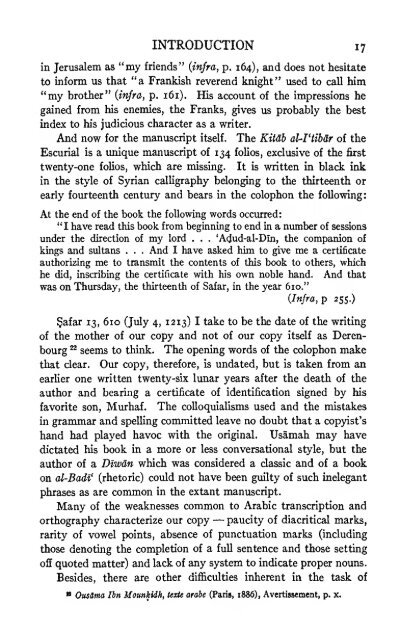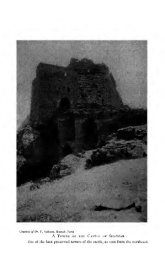You also want an ePaper? Increase the reach of your titles
YUMPU automatically turns print PDFs into web optimized ePapers that Google loves.
INTRODUCTION<br />
i7<br />
<strong>in</strong> Jerusalem as "my friends" (<strong>in</strong>fra, p. 164), <strong>and</strong> does not hesitate<br />
to <strong>in</strong>form us that "a Frankish reverend knight" used to call him<br />
"my bro<strong>the</strong>r" (<strong>in</strong>fra, p. 161). His account <strong>of</strong> <strong>the</strong> impressions he<br />
ga<strong>in</strong>ed from his enemies, <strong>the</strong> Franks, gives us probably <strong>the</strong> best<br />
<strong>in</strong>dex to his judicious character as a writer.<br />
<strong>An</strong>d now for <strong>the</strong> manuscript itself. The Kitab al-I'tibdr <strong>of</strong> <strong>the</strong><br />
Escurial is a unique manuscript <strong>of</strong> 134 folios, exclusive <strong>of</strong> <strong>the</strong> first<br />
twenty-one folios, which are miss<strong>in</strong>g. It is written <strong>in</strong> black <strong>in</strong>k<br />
<strong>in</strong> <strong>the</strong> style <strong>of</strong> <strong>Syrian</strong> calligraphy belong<strong>in</strong>g to <strong>the</strong> thirteenth or<br />
early fourteenth century <strong>and</strong> bears <strong>in</strong> <strong>the</strong> colophon <strong>the</strong> follow<strong>in</strong>g:<br />
At <strong>the</strong> end <strong>of</strong> <strong>the</strong> book <strong>the</strong> follow<strong>in</strong>g words occurred:<br />
"I have read this book from beg<strong>in</strong>n<strong>in</strong>g to end <strong>in</strong> a number <strong>of</strong> sessions<br />
under <strong>the</strong> direction <strong>of</strong> my lord . . . 'Adud-al-D<strong>in</strong>, <strong>the</strong> companion <strong>of</strong><br />
k<strong>in</strong>gs <strong>and</strong> sultans . . . <strong>An</strong>d I have asked him to give me a certificate<br />
authoriz<strong>in</strong>g me to transmit <strong>the</strong> contents <strong>of</strong> this book to o<strong>the</strong>rs, which<br />
he did, <strong>in</strong>scrib<strong>in</strong>g <strong>the</strong> certificate with his own noble h<strong>and</strong>. <strong>An</strong>d that<br />
was on Thursday, <strong>the</strong> thirteenth <strong>of</strong> Safar, <strong>in</strong> <strong>the</strong> year 610."<br />
(Infra, p 255.)<br />
§afar 13, 610 (July 4, 1213) I take to be <strong>the</strong> date <strong>of</strong> <strong>the</strong> writ<strong>in</strong>g<br />
<strong>of</strong> <strong>the</strong> mo<strong>the</strong>r <strong>of</strong> our copy <strong>and</strong> not <strong>of</strong> our copy itself as Derenbourg<br />
22 seems to th<strong>in</strong>k. The open<strong>in</strong>g words <strong>of</strong> <strong>the</strong> colophon make<br />
that clear. Our copy, <strong>the</strong>refore, is undated, but is taken from an<br />
earlier one written twenty-six lunar years after <strong>the</strong> death <strong>of</strong> <strong>the</strong><br />
author <strong>and</strong> bear<strong>in</strong>g a certificate <strong>of</strong> identification signed by his<br />
favorite son, Murhaf. The colloquialisms used <strong>and</strong> <strong>the</strong> mistakes<br />
<strong>in</strong> grammar <strong>and</strong> spell<strong>in</strong>g committed leave no doubt that a copyist's<br />
h<strong>and</strong> had played havoc with <strong>the</strong> orig<strong>in</strong>al. Usamah may have<br />
dictated his book <strong>in</strong> a more or less conversational style, but <strong>the</strong><br />
author <strong>of</strong> a Dlwan which was considered a classic <strong>and</strong> <strong>of</strong> a book<br />
on al-Badi' (rhetoric) could not have been guilty <strong>of</strong> such <strong>in</strong>elegant<br />
phrases as are common <strong>in</strong> <strong>the</strong> extant manuscript.<br />
Many <strong>of</strong> <strong>the</strong> weaknesses common to <strong>Arab</strong>ic transcription <strong>and</strong><br />
orthography characterize our copy — paucity <strong>of</strong> diacritical marks,<br />
rarity <strong>of</strong> vowel po<strong>in</strong>ts, absence <strong>of</strong> punctuation marks (<strong>in</strong>clud<strong>in</strong>g<br />
those denot<strong>in</strong>g <strong>the</strong> completion <strong>of</strong> a full sentence <strong>and</strong> those sett<strong>in</strong>g<br />
<strong>of</strong>f quoted matter) <strong>and</strong> lack <strong>of</strong> any system to <strong>in</strong>dicate proper nouns.<br />
Besides, <strong>the</strong>re are o<strong>the</strong>r difficulties <strong>in</strong>herent <strong>in</strong> <strong>the</strong> task <strong>of</strong><br />
" Ousima Ibn Mounkidh, texte arabe (Paris, 1886), Avertissement, p. x.



